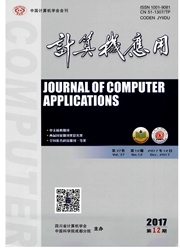

 中文摘要:
中文摘要:
针对路网环境中移动对象轨迹隐私泄露以及语义位置同质性攻击等问题,提出了一种路网环境中感知隐私的轨迹数据采集(PTDC)算法。首先,通过兴趣位置(POI)访问人次的信息墒计算路网中POI的敏感性;其次,根据顶点间敏感性和距离的混合差距,定义了θ-边权,并建立路网空间的图模型、定义了k-θ-D匿名模型以抵御语义位置同质性攻击;最后,以无向图的广度优先遍历为基础,设计了满足POI语义差异性的匿名算法,将用户的敏感采样位置用匿名区域取代,并衡量了PTDC算法处理后数据的可用性。通过实验对PTDC算法进行了验证,并和自由空间中的基于语义位置的隐私保护算法——YCWA进行了比对。理论上讲,YCWA算法的隐私保护度低于PTDC算法。实验表明,PTDC算法的信息丢失率平均在15%左右,空间范围查询误差平均在12%左右,略逊于YCWA算法;然而,PTDC算法的运行时间在5 s以内,远远优于YCWA算法,可满足实时在线数据采集的需求。
 英文摘要:
英文摘要:
Since the problem of trajectory privacy violation and homogeneous semantic location attack of moving objects in road network environment is very serious, a Privacy-aware Trajectory Data Collection (PTDC) algorithm was proposed. Firstly, through visits' entropy of Points Of Interests (POI), the sensitivity of each POI was computed; secondly, based on the mixture distance of sensitivity and Euclidean distance, θ-weight was defined and a weighted model of vertices and edges in the network environment was established to reach a k-θ-D anonymity, which can resist the semantic location homogeneity attack; finally, based on the bread-first traversal algorithm of undirected graph, an anonymous algorithm was proposed to satisfy the semantic difference of POIs, so that user's sensitive sampling location was replaced by an anonymous region. Data utility caused by PTDC algorithm was theoretically evaluated. A set of experiments were implemented to test PTDC algorithm, and compare it with the privacy-preserving algorithm named YCWA (You Can Walk Alone) in free space. In theory, the privacy level of YCWA algorithm was lower than PTDC algorithm. The experimental results show that the PTDC algorithm has an average information loss of about 15%, and average range count query error rate of about 12%, which performs slightly worse than YCWA algorithm, while the running time of PTDC algorithm is less than 5 seconds, which is much better than YCWA algorithm. PTDC algorithm meets the needs of real-time online data collection.
 同期刊论文项目
同期刊论文项目
 同项目期刊论文
同项目期刊论文
 期刊信息
期刊信息
